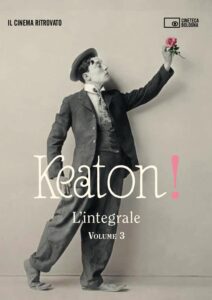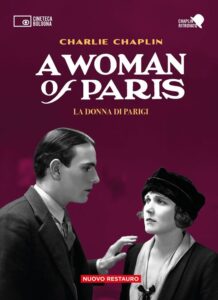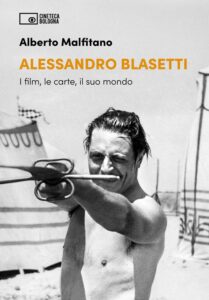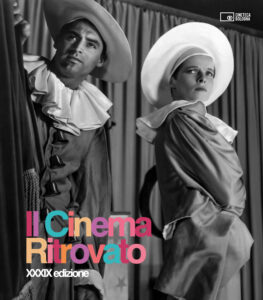PUBLICATIONS
IL CINEMA RITROVATO 2025
FESTIVAL CATALOGUE |
Book, pp. 454
Our catalogue is more than a guide to our films! It’s an essential part of the festival, an encyclopedia of knowledge which arouse curiosity, put the films in their proper historical context and preserve the memory of the films seen. Please note that the information in the catalogue is also available online.
 KEATON! L’integrale
KEATON! L’integrale
Volume 3 | 3 DVD, 3 Blu-ray e booklet, 549’ e pp. 72
Buster Keaton. L’integrale, third and final volume. Twelve films that reaffirm the boundless talent of the great stone-faced comedian and his remarkable ability to cross genres and blend their conventions: from the Griffith-style historical epic Three Ages to western parodies such as Our Hospitality and The Paleface, from the farcical misunderstandings of My Wife’s Relations to the romantic comedy Spite Marriage, Keaton’s last silent film appearance. Also included are brilliant variations on the timeless struggle between Buster and the alienating forces of mechanised modernity (The Electric House, The Haunted House and The Navigator); his astonishing acrobatic daring in the chaotic gags of The Goat; and an unexpected sporting twist in College and Battling Butler. Last but not least, the surreal black comedy Hard Luck – a rediscovered gem that resurfaced after more than 50 years of obscurity. The films are accompanied by original scores composed by Timothy Brock, Daniele Furlati, Stephen Horne and Mirco Mariani, capturing all the richness of these timeless masterpieces. A richly illustrated booklet edited by Cecilia Cenciarelli is included.
 Charlie Chaplin A WOMAN OF PARIS – LA DONNA DI PARIGI
Charlie Chaplin A WOMAN OF PARIS – LA DONNA DI PARIGI
2 DVD e booklet, 89’, 102’ e pp. 80
In 1923, finally tasting creative independence, Charlie Chaplin defied all expectations: the first film he directed, produced and distributed on his own was not a comedy. It was a melodrama – without the Tramp. Audiences were so bewildered that cinemas had to post warning signs at the box office, yet critics were unanimous in their praise. Chaplin had created something unique, propelling the art of directing to a new level. The story was inspired by Peggy Hopkins Joyce, a famous gold-digger who drove a young lover to suicide. Chaplin probes deep into and beyond the moral conventions and bourgeois respectability he had already skewered in his comedies. His refined psychological portrayal of the characters elevated him to the status of a “philosopher of human nature”. And yet A Woman of Paris was not a success, and Chaplin abandoned the path of dramatic storytelling. What might have been, we will never know. What we do know is that he went on to become the comic genius we all know and love. And we know that this gem – perfect in every way – is, more than a hundred years after its creation, a masterpiece waiting to be rediscovered.
FUORI. UN FILM DI MARIO MARTONE
edited by Paolo Mereghetti e Alberto Libera
Libro, pp. 176
“We adapted two novels by Goliarda Sapienza, L’università di Rebibbia and Le certezze del dubbio, weaving them together to create two parallel films – one set inside prison and the other outside” (Mario Martone). The only Italian film in competition at the 2025 Cannes Film Festival, Fuori by Mario Martone stems from the director’s collaboration with screenwriter Ippolita di Majo and their shared exploration of Goliarda Sapienza’s world. “More than a ‘story’, it’s a portrait – a portrait of a woman and her friendships, like certain Renaissance paintings where the central Madonna draws meaning and strength from those beside her, from those who offer her their closeness. It’s through the relationships she builds with these women that we come to understand who Goliarda Sapienza was, what her experience at Rebibbia meant to her, and why she chooses to keep spending time with former inmates” (Alberto Libera and Paolo Mereghetti). The book includes reconstructions of various screenplay drafts, a piece by the director, the original treatment, two interviews (with lead actress Valeria Golino and Ippolita di Majo), a critical essay and a profile of Goliarda Sapienza. It also features photographs taken during the film’s preparation and shooting.
 ALESSANDRO BLASETTI
ALESSANDRO BLASETTI
I film, le carte, il suo mondo
Alessandro Malfitano | Libro, pp. 319
Alessandro Blasetti was one of the leading figures of 20th-century Italian cinema. First as a passionate critic and then as a filmmaker, he played a key role in reviving the national film industry at the end of the 1920s, during the Fascist era – which he initially supported before distancing himself, later making postwar films that combined a taste for spectacle with pacifist values. A tireless director – as well as a brilliant screenwriter, curious experimenter, teacher and talent scout – Blasetti worked across a wide range of genres, often producing innovative and highly successful films, such as 1860, La corona di ferro, La cena delle beffe, Quattro passi fra le nuvole, Fabiola, Altri tempi, Peccato che sia una canaglia ed Europa di notte. Alberto Malfitano traces his career starting from the vast personal archive held at the Cineteca di Bologna – a precious trove of thousands of documents that opens a window onto Blasetti’s world and his many intersections with 20th-century Italian culture and society.



